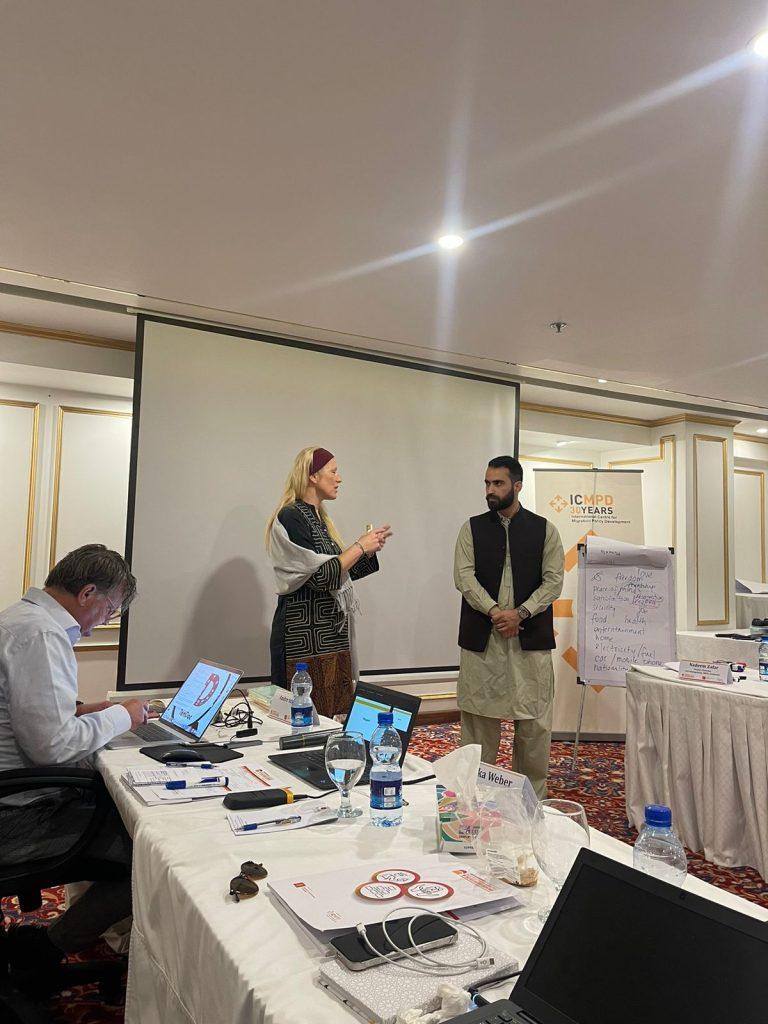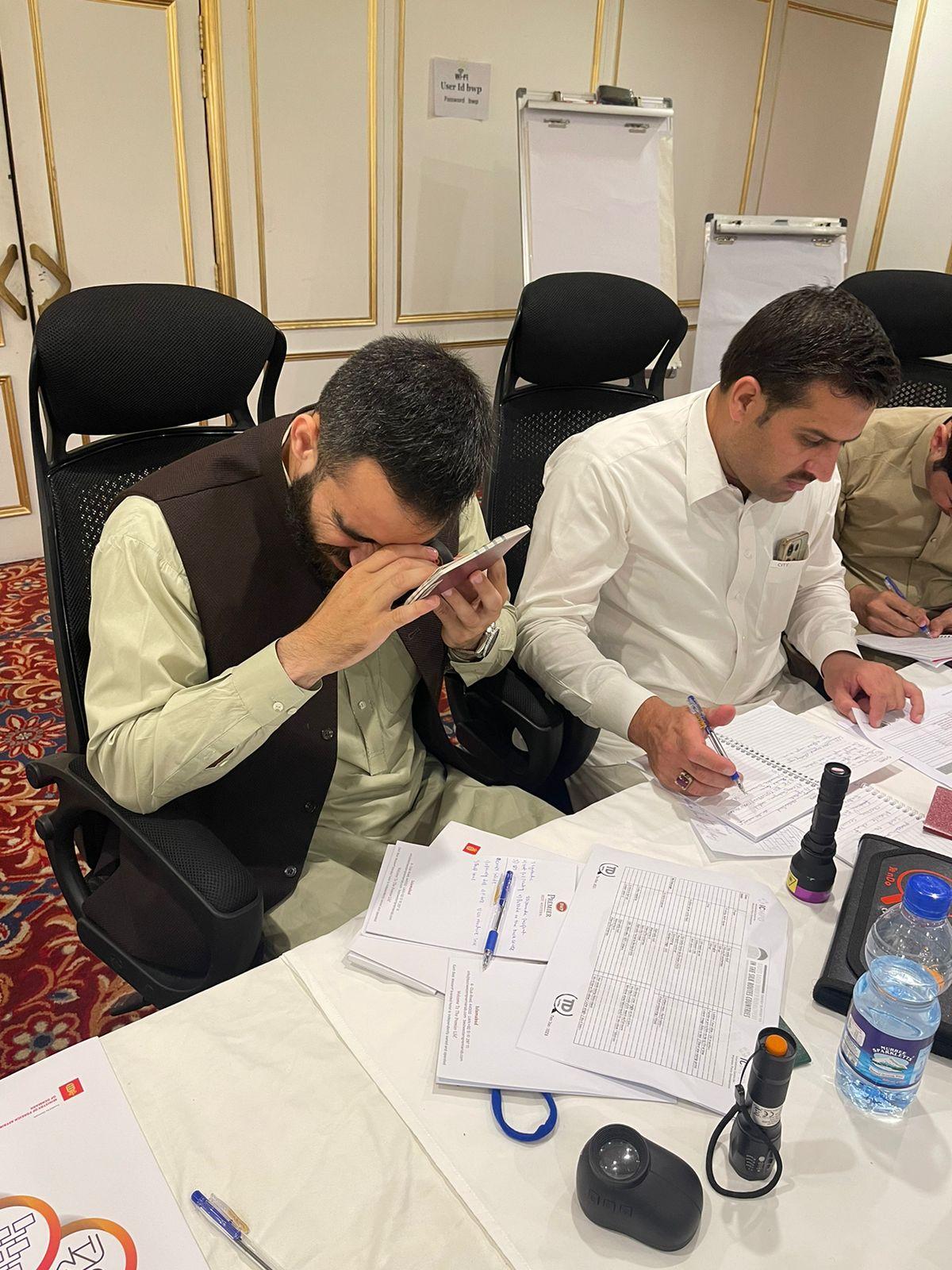A cohort of 13 immigration officers from the Federal Investigation Agency stationed at Peshawar airport and Torkham land border crossing point (BCP) completed an advanced 10 day training programme to prepare them to act as advanced document examination and border control experts at international airports, at the so -called 2nd line border control point.
The training programme, consisting of three parts and completed under the framework of the Danish funded Rights-Based Border Management in the Silk Routes countries project, is part of a wider initiative seeking to introduce 2nd line control offices at air BCPs across Pakistan. The aim is to enhance the capacity of the FIA to intercept fake and fraudulent travel documents, and mitigating risks associated with irregular migration and transnational crimes, while maintaining a strong commitment to upholding the human rights of all individuals at the border.
The first part of this comprehensive training programme was conducted in Peshawar on 23-26 April and attended by 13 designated Second Line Border Control Officers from Bacha Khan International Airport and Torkham Land Border Crossing Point. The training was led by a combined team of international and national experts, including FIA Master Trainers on document security experts.
The second part of the training programme was held at Islamabad on 7-10 May for the same group, and was concluded with a third part focused on training of trainers (ToT) to equip the participants with the skills to deliver the workshops themselves to their colleagues at their respective BCPs.

The training covered all core skills and knowledge required for the officers to operate as advanced border control and document examination officers at border crossing points. Subjects included document examination, forgery detection methods and security features, behavioural analyses, interviewing techniques crucial for identifying potential threats while maintaining international human rights standards.
Officers combined practiced practical skills and exercises using forgery detection equipment and international document databases with theoretical study of advanced procedures and operation of a Second Line of Control Office.
The second part of the training at advanced level emphasized reporting and information exchange on modus operandi and trends, the basics of Advance Passenger Information (API) and Passenger Name Record (PNR), as well as sessions delivered by in-house FIA experts on utilising the national entry-exit database. A human rights-based and gender-responsive approach to border management was integrated throughout all sessions, with participants being trained to identify and respond to passengers and migrants in vulnerable situations with sensitivity. The training culminated in rigorous practical sessions and formal assessments, ensuring that the participants were proficient in their knowledge and skills. The practical exercises included creating fraud alerts and information sharing through reporting.
The training programme has enhanced the knowledge and skills of immigration officials and combined with the recent establishment of 2nd line offices at 4 major air BCPs in Pakistan will have a tangible effect on combating irregular migration at Pakistan borders.
The programme received the full support of airport management, who acknowledged the impact it was having: “As Deputy Director of Immigration at Bacha Khan International Airport Peshawar, I have witnessed firsthand the immense benefits of the three-part training programme for the Second Line Border Control Officers on document security, second line functions and the training of trainers delivered by ICMPD in partnership with FIA. This comprehensive programme will significantly enhance the capabilities of our second line border control officers, equipping them with advanced skills in detecting fraudulent documents and improving overall border security. I also had the opportunity to attend the training myself and can attest to its effectiveness and the positive impact it has had on our immigration operations at Peshawar airport.” Nadeem Zafar, Deputy Director of Immigration, Bacha Khan International Airport Peshawar.
The 13 officers will lead the introduction of a 2nd line border control at Peshawar airport through a pilot phase planned across the Q3 2024, where they will test the implementation of recently adopted Guidelines for the operation of a 2nd line control, and utilise newly furnished and equipped 2nd line office inside the airport. At a national level, the officers at Peshawar and Torkham are complemented by a further 53 FIA colleagues trained as 2nd line officers under the RBM Silk Routes project at Islamabad, Lahore, Multan, Karachi and Quetta airports, and the ongoing work to equip and open 2nd line control offices at Islamabad, Lahore, Karachi and Multan airports in 2024, as well as a renovated forensic document examination laboratory at FIA Headquarters.
The RBM Silk Routes project is funded by the Danish Ministry of Foreign Affairs and implemented by ICMPD with the objective of implementing sustainable, rights-based, border management practices in Iraq and Pakistan towards increasing border management and security and reducing irregular migration.
